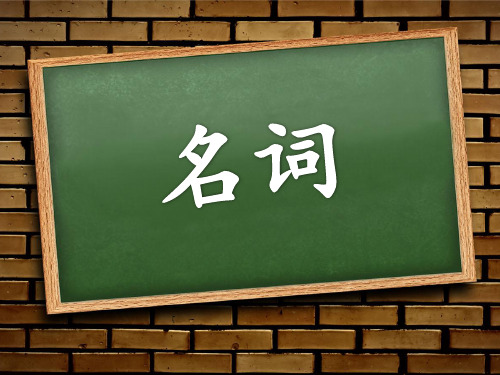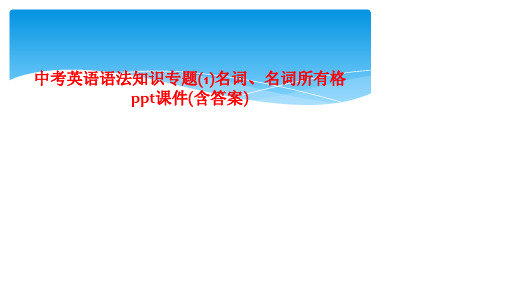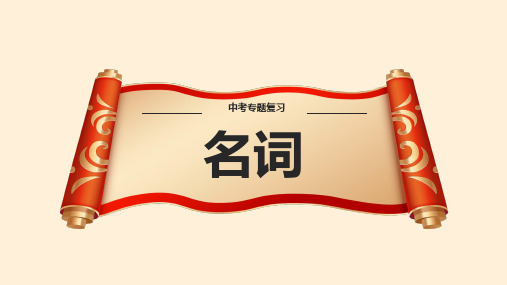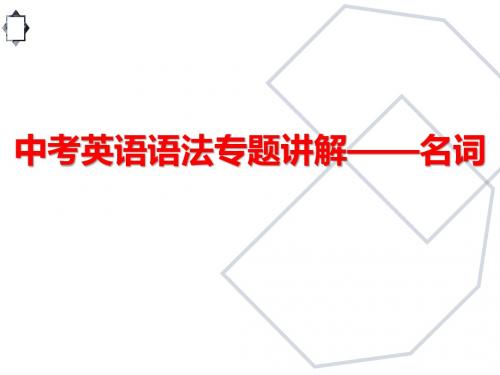中考名词考点(可直接使用).ppt
合集下载
中考英语专题复习名词课件(共30张PPT)

beliefs,roofs,gulfs,chiefs,cliffs
⑵单数变复数的不规则变化。
man-men woman-women child-children
tooth-teeth foot-feet goose-geese
mouse-mice ox-oxen
sheep fish deer Chinese Japanese
man
woman
tooth
men
women
teeth
child children
ox oxen
fish
sheep
fish
sheep
a bag of rice→two bags of rice
a piece of paper→three pieces of paper
不可数名词一 般没有复数形 式,说明其数量 时,要用有关计 量名词。
英语语法基础知识 名词
词的类别
Tom London
France
the World Trade Organization (WTO)
专有名词如果是含有普通名词 的短语,则要使用定冠词the。
如:the Great Wall;
the People’s Republic of China
2. 普通名词是指人、事和物的 名称的。20. babyb Nhomakorabeabies
21. German Germans
22. woman women
23.Frenchman Frenchmen
24. dish
dishes
一双鞋 a pair of shoes 两杯水 two glasses of water 三克金子 three grams of gold 四个西红柿 four tomatoes
⑵单数变复数的不规则变化。
man-men woman-women child-children
tooth-teeth foot-feet goose-geese
mouse-mice ox-oxen
sheep fish deer Chinese Japanese
man
woman
tooth
men
women
teeth
child children
ox oxen
fish
sheep
fish
sheep
a bag of rice→two bags of rice
a piece of paper→three pieces of paper
不可数名词一 般没有复数形 式,说明其数量 时,要用有关计 量名词。
英语语法基础知识 名词
词的类别
Tom London
France
the World Trade Organization (WTO)
专有名词如果是含有普通名词 的短语,则要使用定冠词the。
如:the Great Wall;
the People’s Republic of China
2. 普通名词是指人、事和物的 名称的。20. babyb Nhomakorabeabies
21. German Germans
22. woman women
23.Frenchman Frenchmen
24. dish
dishes
一双鞋 a pair of shoes 两杯水 two glasses of water 三克金子 three grams of gold 四个西红柿 four tomatoes
中考英语语法专项1:名词课件(共46张PPT)

* boy – boys holiday-holidays * monkey – monkeys
(4) 以f、fe 结尾的名词,变f、fe 为v再加 “es” ,读作/vz/
* half – halves * shelf – shelves * knife – knives * leaf – leaves
Mary's and Jane's cars(她俩各自的车)
(4)表示店铺、住宅、公共建筑等地点时,名 词所有格后面的名词习惯上省略。如: the barber's=the barber's shop理发店 to my aunt's=to my aunt's house到我姑姑家 (5)有些指时间、距离、重量、价值、国家和 城镇等无生命的名词,也可以加's构成所有 格。如: a week's time 一周的时间 China's population中国的人口
( D ) 4. When we got to his room, we found three , two and two in it. A. tomatoes; radio; photos B. tomato; radios; photos C. tomato; radio; photos D. tomatoes; radios; photos ( B ) 5. He has four . All of them can brush their by themselves. A. children; tooth B. children; teeth C. child; teeth D. child; tooth
( C ) 6. Here come three . One of them is my math teacher, Mr. Hu. A. man teacher B. woman teacher C. men teachers D. women teachers ( B ) 7. Near our school there are three . You can buy some animal toys for your children. A. toy factory B. toy factories C. paper factory D. paper factories ( A ) 8. A group of are talking with two . A. Frenchmen; Germans B. German; Frenchmen C. Frenchman; German D. Germans; Frenchman
中考英语专题复习——名词 课件(40张PPT)

不可数名词可以用单位词来计量
三、名词所有格
名词所有格の‘s
1. Mike ‘s father
一般情况下在名词词尾加‘s
2. the teachers' room
以s结尾的复数名词加‘
3. Engels’s work=Engels’work
以s结尾的人名后加‘s或’
4. Women’s Day
不以s结尾的复数名词后加‘s
五、名词的辨析
名词的辨析
可数
不可数
job
名词的辨析
短假,节 日
长假
holiday
名词的辨析
家
家庭
房子 建筑
居住的地 方
family
house
home
统指衣服, 上衣,裤 子,内衣
等
名词的辨析
不可数名 词,指布
料
集合名词, 是衣服服 装的统称
clothes
cloth
clothing
旅行或旅 游的总称
四、名词的句法功能
名词的句法功能
定语 主语
状语 宾语
宾补
表语
同位语
名词的句法功能
1. Some boys are playing football in the park. 主语 2. We are discussing the population problem. 定语 3. Edison is a great American inventor. 表语 4. I will see you Saturday. 状语 5. He bought a new jacket last week. 宾语 6. She found him a very good pupil. 宾补 7. Miss Yang, our English teacher, is very young. 同位语
三、名词所有格
名词所有格の‘s
1. Mike ‘s father
一般情况下在名词词尾加‘s
2. the teachers' room
以s结尾的复数名词加‘
3. Engels’s work=Engels’work
以s结尾的人名后加‘s或’
4. Women’s Day
不以s结尾的复数名词后加‘s
五、名词的辨析
名词的辨析
可数
不可数
job
名词的辨析
短假,节 日
长假
holiday
名词的辨析
家
家庭
房子 建筑
居住的地 方
family
house
home
统指衣服, 上衣,裤 子,内衣
等
名词的辨析
不可数名 词,指布
料
集合名词, 是衣服服 装的统称
clothes
cloth
clothing
旅行或旅 游的总称
四、名词的句法功能
名词的句法功能
定语 主语
状语 宾语
宾补
表语
同位语
名词的句法功能
1. Some boys are playing football in the park. 主语 2. We are discussing the population problem. 定语 3. Edison is a great American inventor. 表语 4. I will see you Saturday. 状语 5. He bought a new jacket last week. 宾语 6. She found him a very good pupil. 宾补 7. Miss Yang, our English teacher, is very young. 同位语
人教版英语中考复习:名词专题 (共35张PPT)

kangaroo, photo
11
【策略点播】
• 2. 以f(e)结尾的名词变复数,需要把-f(e)改为v,再加-es常见的有9个, 它们分别是:wife, knife , wolf, thief, shelf, self, life, half, leaf 。
• 可以这样记: 妻子持刀去宰狼,小偷吓得发了慌;(wife,knife , wolf,thief )
如:the Great Wall
3
2.2 普通名词
可数名词
个体名词,表示某类人或事物中的个体 集体名词,表示若干个体组成的集合体
如:pen, worker 如:family, class, team
普通名词 不可数名词
物质名词,表示无法分为个体的物质或实物 如:water, time, air
抽象名词,表示品质、状态、感情等抽象的 如:happiness, honesty(诚
5
注意
• 既可数又不可数的名词,但意义不同。如:
• chicken—鸡(可数); 鸡肉(不可数)
room—房间(可数); 空间(不可数)
• fish—鱼(可数); 鱼肉(不可数)
glass—玻璃杯(可数); 玻璃(不可数)
• paper—试卷,报纸(可数); 纸张(不可数) 数)
time—倍数,次数(可数); 时间(不可
• 2. The team often wins (win) the matches. After winning, the team have (have) a shower.
• ( ) 3. He is ______________ .
• A. an English
B.a Englishman
11
【策略点播】
• 2. 以f(e)结尾的名词变复数,需要把-f(e)改为v,再加-es常见的有9个, 它们分别是:wife, knife , wolf, thief, shelf, self, life, half, leaf 。
• 可以这样记: 妻子持刀去宰狼,小偷吓得发了慌;(wife,knife , wolf,thief )
如:the Great Wall
3
2.2 普通名词
可数名词
个体名词,表示某类人或事物中的个体 集体名词,表示若干个体组成的集合体
如:pen, worker 如:family, class, team
普通名词 不可数名词
物质名词,表示无法分为个体的物质或实物 如:water, time, air
抽象名词,表示品质、状态、感情等抽象的 如:happiness, honesty(诚
5
注意
• 既可数又不可数的名词,但意义不同。如:
• chicken—鸡(可数); 鸡肉(不可数)
room—房间(可数); 空间(不可数)
• fish—鱼(可数); 鱼肉(不可数)
glass—玻璃杯(可数); 玻璃(不可数)
• paper—试卷,报纸(可数); 纸张(不可数) 数)
time—倍数,次数(可数); 时间(不可
• 2. The team often wins (win) the matches. After winning, the team have (have) a shower.
• ( ) 3. He is ______________ .
• A. an English
B.a Englishman
中考英语语法知识专题(1)名词、名词所有格ppt课件(含答案)

中考英语语法知识专题(1)名词、名词所有格 ppt课件(含答案)
名词 (一)名词的分类:名词是表示人或事物名称的词。它分为专有名词和普通名词。
类别
定义
例词
专有名词
表示具体的人名,事物, China,the Great 地名,组织等名称的词。 Wall
可数 普通
名词 不可
数
个体名词 集体名词 物质名词 抽象名词
Lucy with her friends goes (go) to the park every Sunday.
5.表时间、金钱、距离的名词作主语时,视为一个整体,谓语动词用单数。 Ten years is (be) a very long time. 6.常考的不可数名词 room=space 空间;空地 There is no room to put the desk here. news,information,advice,weather,music,pollution, population... 7.exercise 作不可数名词,意为“锻炼”。作可数名词意为“练习;操”。 We should take more exercise.It’s good for our health. Doing more eye exercises is good for our eyesight. To get high scores we should do many math exercises every day.
名词的形容词转换: n.+y rain—rainy cloud—cloudy sun—sunny luck—lucky health—healthy n.+ful use—useful harm—harmful beauty—beautiful care—careful wonder— wonderful thank—thankful n.+less useless care—careless help—helpless n.+ly friend—friendly love—lovely month—monthly n.+n Asia—Asian America—American Australia—Australian n.+en wool—woolen wood—wooden gold—golden
名词 (一)名词的分类:名词是表示人或事物名称的词。它分为专有名词和普通名词。
类别
定义
例词
专有名词
表示具体的人名,事物, China,the Great 地名,组织等名称的词。 Wall
可数 普通
名词 不可
数
个体名词 集体名词 物质名词 抽象名词
Lucy with her friends goes (go) to the park every Sunday.
5.表时间、金钱、距离的名词作主语时,视为一个整体,谓语动词用单数。 Ten years is (be) a very long time. 6.常考的不可数名词 room=space 空间;空地 There is no room to put the desk here. news,information,advice,weather,music,pollution, population... 7.exercise 作不可数名词,意为“锻炼”。作可数名词意为“练习;操”。 We should take more exercise.It’s good for our health. Doing more eye exercises is good for our eyesight. To get high scores we should do many math exercises every day.
名词的形容词转换: n.+y rain—rainy cloud—cloudy sun—sunny luck—lucky health—healthy n.+ful use—useful harm—harmful beauty—beautiful care—careful wonder— wonderful thank—thankful n.+less useless care—careless help—helpless n.+ly friend—friendly love—lovely month—monthly n.+n Asia—Asian America—American Australia—Australian n.+en wool—woolen wood—wooden gold—golden
名词(30张PPT)初中英语专题复习课件

(2)可数名词复数的不规则变化
不规则变化 ① 变化元音字母构成复数 ② 单复数形式相同
示例 foot→ feet, goose→ geese, tooth→ teeth, man→ men, woman→ women sheep, deer, fish (注意:fish指鱼的数量时单复数同形 ;指鱼的种类时复数是fishes)
初中英语专题复习
名词
名词概述 名词属于十大词类中的一种,主要包括普通名词和专 有名词两种。纵观近几年中考对于名词的考查,主要以 选择题和填空题为主,考查内容以词义理解、名词所有 格及词形转换居多。在中考备考时,注意掌握名词变复 数的变化规则,掌握不可数名词向可数名词转化的规律, 名词所有格的用法,名词的句法功能等,并做到灵活运 用,以便提高综合运用能力。
8. trip, journey, travel和voyage
词条 trip journey travel voyage
用法 指短期的具有特定目的的旅行
指稍长的旅途 是最常用的,指旅行或普通出行
指海上航行
核心考点提炼·考向探究
中考高频易混易错名词梳理
9. sport和game
词条 sport game
(3)有些名词既可作可数名词,又可作不可数名词,但意思不同。
名词
词义
可数
不可数
名词
词义
可数
不可数
change chicken exercise experience
fish
变化 小鸡 习题 经历 鱼(类)
零钱 鸡肉 锻炼 经验 鱼肉
glass light orange room time
玻璃杯 电灯 橙子 房间 次数;倍数
用于有生命的及表示 时间、距离、国家、
中考英语语法大全——名词(共24张PPT)

(1) 采用改变内部元音的方法构成复数形式,读音也随之改变。
foot→feet
tooth→teeth mouse→mice man→men
woman→women
goose →geese
(2) 在词尾加-(r)en的情况
child →children ox→ish sheep deer means series species
C. 表示时间、距离、度量衡、价值、自然现象、国家、城镇等无生命事物的名 词,也可用-'s所有格。 eg: The boss gave me two days' holiday because of my illness. eg: Today's newspaper is on your table. eg: China's weather is quite different from south to north. D. 表示诊所、店铺、医院、学校、住宅或公共建筑时,-'s所有格后常常不出现 其所修饰的名词。 eg: Little Tom is being scolded at the teacher's office. eg: I often buy meat at the butcher's shop.
of所有格的构成和用法
(1)一般来说,无生命的名词常用of所有格形式。 eg: The leaves of most trees will fall in autumn. eg: There is something wrong with the engine of the car.
(2)有时也用来表示人或其他有生命的名词。 eg: When in trouble, I usually ask for the advice of my teachers. eg: That’s the opinion of my parents, not mine.
2024年九年级英语中考专题复习名词课件(共35张PPT)

一张爸爸的照片 a photo of my father
易错点二 名词所有格
1. 刚才,摄影比赛的结果贴在布告板上了! ___J_u_s_t _n_o_w_,_th_e__p_h_o_to_g_r_a_p_h__co_m__p_e_ti_ti_o_n_’s__re_s_u_lt_w__a_s_p_o_s_te_d_______ ___o_n_t_h_e_b_u_l_le_t_in__b_o_a_rd_!___________________________________ 2. 那天我们玩的很开心,但第二天的旅行却很不好。 We had a good time that day, ___b_u_t_th_e__n_e_x_t _d_a_y_’s__tr_ip__w_a_s_p_r_e_tt_y_b_a_d_.______________________ 3. 训练学生的生活技能很重要。 ___It_i_s_v_e_r_y_i_m_p_o_r_ta_n_t_t_o_t_ra_i_n_s_t_u_d_e_n_ts_’ _li_fe__sk_i_ll_s.________________
PART 3
Engage
易错点三 名词辨析
information 信息 fun
乐趣 traffic 交通 research 研究
homework 作业 noise
噪音 sound 声音 voice 嗓音
accident
事故 luggage 行李 position 方位 situation 形势
work
(特殊:roofs, proofs, beliefs) • 以 o 结尾,无生命加 s • 以 o 结尾,有生命加 es
(个别以o结尾的可加s,也可 加es,如mango,复数形式 mangos和mangoes都可以)
易错点二 名词所有格
1. 刚才,摄影比赛的结果贴在布告板上了! ___J_u_s_t _n_o_w_,_th_e__p_h_o_to_g_r_a_p_h__co_m__p_e_ti_ti_o_n_’s__re_s_u_lt_w__a_s_p_o_s_te_d_______ ___o_n_t_h_e_b_u_l_le_t_in__b_o_a_rd_!___________________________________ 2. 那天我们玩的很开心,但第二天的旅行却很不好。 We had a good time that day, ___b_u_t_th_e__n_e_x_t _d_a_y_’s__tr_ip__w_a_s_p_r_e_tt_y_b_a_d_.______________________ 3. 训练学生的生活技能很重要。 ___It_i_s_v_e_r_y_i_m_p_o_r_ta_n_t_t_o_t_ra_i_n_s_t_u_d_e_n_ts_’ _li_fe__sk_i_ll_s.________________
PART 3
Engage
易错点三 名词辨析
information 信息 fun
乐趣 traffic 交通 research 研究
homework 作业 noise
噪音 sound 声音 voice 嗓音
accident
事故 luggage 行李 position 方位 situation 形势
work
(特殊:roofs, proofs, beliefs) • 以 o 结尾,无生命加 s • 以 o 结尾,有生命加 es
(个别以o结尾的可加s,也可 加es,如mango,复数形式 mangos和mangoes都可以)
中考英语语法专题复习:名词(共19张PPT)

15 —Who did you spend last weekend with? —________. A. Palmer’s B. The Palmers’ C. The Palmers D. The Palmer’s
中考英语语法: 名词备考知识点
考点分析
1、名词辨析:
名词辨析的考查角度以语境类辨析和近义词 辨析为主,少量涉及词性辨析、常识辨析及固 定搭配。
2、名词单复数:
名词单复数考查数量较少,包括规则变形和不 规则变形两种。
3、名词所有格:
名词所有格考查数量较少,包括两者共有的所 有格,时间名词所有格,数量词所有格的用法。
C. A large number of D. Quite a few
7. –– Let’s try operating the machine right now.
––Wait. Better read the _____first.
A. instructions B. explanations
有一些事不规则变化,需改变单数名词中的元音 字母如:man-men woman-women foot-feet tooth-teeth
还有单复数形式相同的情况,读音不变,如: fish-fish sheep-sheep deer-deer ChineseChinese Japanese-Japanese
2.近义词辨析
对近义名词有考查,如message口 信,information信息。
message为可数名词,指口信,常用词组: leave或take a message; information指消息、 信息、资料。
常见近义词组(学生可以根据以下词条进行归 纳记忆)。 1. advice与suggestion 2. problem与question 3. house, home, family与room 4. idea, thought与opinion 5. job与work 6. voice, noise与sound 7. message, news与information
中考英语语法考点复习总结——名词(共20张PPT)

以o结尾的名词变复数时,有生命的名词在词尾加es, 无生命的名词在词尾加s。(kangaroo和bamboo 除 外) 加es: potato, tomato, hero, Negro, mango 加s:zoo, radio, photo, piano, kangaroo, bamboo
如果复合名词前面的名词是man或woman,变复数 时,构成复合名词的两个名词全部都要变成复数形式; 如果是其他词,变复数时,只需把后面的名词变成复 数形式。 man teacher →men teachers woman driver→ women drivers, boy student →boy students apple tree →apple trees
考点二:名词所有格
考点1:名词所有格的表达
1.有生命的名词所有格在词尾加’s。若是复数并以s 或es 结尾的名词只加“’”。表示时间、空间、距 离、价格重量的名词所有格和表示世界、国家和城镇 的所有格及某些习惯表达法也使用’s所有格。 2. 无生命的名词用of构成所有格。
考点2:几个人共同拥有一样东西的所有格表达法: 格用法比较
of 所有格既可用于有生命的人或物,也可用于无生命的东西。当用于有生 命的人或物时,of 所有格有时可以与's 所有格互换。 如:Mr. Smith’s son = the son of Mr. Smith 史密斯先生的儿子 Jim’s patience = the patience of Jim 吉姆的耐心 the Queen’s arrival = the arrival of the Queen 女王的到达
考点2:可数名词的复数形式
可数名词复数的变化规则如下:
(1)一般情况词尾加s,如 book→books, desk→desks等。其读音规则 是在清辅音后读[s],在元音和浊辅音后读[z]。 (2)以 s, x, sh, ch 等结尾的名词,通常在词尾加es,如:bus→buses, box→boxes, dish→dishes等。其读音为[iz]。 (3)以“辅音字母+y”结尾的名词,变y为i再加es,如:family→families, butterfly→butterflies。其读音为[z]。 (4)以f、fe结尾的词,把f或fe变为v再加es,如:leaf→leaves, life→lives等,其读音为[vz]。 (5)以“元音字母+y”结尾的词,直接加s,如: toy→toys, 其读音为[ z ]。
中考英语语法专题讲解——名词(共15张PPT)

7 、 双 重 所 有 格 有 两 种 形 式 : o f + 名 词 所 有 格 ; o f + 名 词性物主代词。
He is a friend of my brother’s. Is she a daughter of yours?
同一名词可数与不可数意义的区别
fish 鱼(可数名词) chicken 鸡(可数名词) paper 试卷(可数名词) glass 玻璃杯(可数名词) room 房间(可数名词)
抽象名词
表示状态、品质、行为、感情等抽象概念的 词
love, health
变化规则
情况
构成方法
一般情况
加-s
以-s, -x, -sh, -ch结尾的词
加-es
以辅音字母加y结尾的词
变y为i,再加-es
以f或fe结尾的词
变f和fe为v,再加es
以-o结尾的词
有生命的加-es 无生命的加-s
改变单数名词中的元音字母
某国人变复数
• ①单复数相同 • Chinese-Chinese • Japanese-Japanese • ②由-man构成的复合名词 • Englishman-Englishmen • Frenchman-Frenchmen • 注意:German-Germans • ③以(i)an结尾的名词 • American-Americans • Arab-Arabs • Egyptian-Egyptians • Australian-Australians
5、表示店铺、医院、诊所、住宅等名称时,常在名词 后面加上’s,表示该处所。
at the doctor’s=at the doctor’s office
6、表示时间、距离、国家、城市等无生命的名词,也 可以用’s所有格。
中考英语语法专项复习课件:名词(共69张PPT)

在词尾加en
f在词尾加en
其他特殊变化
mouse→mice
类型
例词
单复数同形
sheep, deer, police, people, Chinese, Japanese
有一些名词只用于复数形式
trousers, socks, shoes, scissors gloves, glasses, pants
解析: 根据题干可知,此处指的是Mike和Jack各自的爸 爸,如某人某物为两人以上共有,则只在最后一个名词词 尾加's;若非共有,则在每个名词的词尾加's。此处表示 分别所有,则在每个名词的后面加's。 答案: C 【方法总结】 共同拥有格在最后,各自拥有各有所格。
一、单项选择 1.(2018·重庆中考B卷)—How far is it from Chongqing to Guiyang? —It's about two ___ ride by highspeed train. A.hour B.hour's C.hours D.hours'
语法一 名词
考点一 名词的数 1.可数名词变复数变化规则 (1)变化规则
种类
变化
例词
一般情况
加s
desk→desks, map→maps
以s/x/sh/ch结尾
加es
bus→buses, box→boxes, dish→dishes, watch→watches
以辅音字母+y结尾的词
变y为i加es
city→cities, factory→factories
以元音字母+y结尾的词
加s
monkey→monkeys, toy→toys
f在词尾加en
其他特殊变化
mouse→mice
类型
例词
单复数同形
sheep, deer, police, people, Chinese, Japanese
有一些名词只用于复数形式
trousers, socks, shoes, scissors gloves, glasses, pants
解析: 根据题干可知,此处指的是Mike和Jack各自的爸 爸,如某人某物为两人以上共有,则只在最后一个名词词 尾加's;若非共有,则在每个名词的词尾加's。此处表示 分别所有,则在每个名词的后面加's。 答案: C 【方法总结】 共同拥有格在最后,各自拥有各有所格。
一、单项选择 1.(2018·重庆中考B卷)—How far is it from Chongqing to Guiyang? —It's about two ___ ride by highspeed train. A.hour B.hour's C.hours D.hours'
语法一 名词
考点一 名词的数 1.可数名词变复数变化规则 (1)变化规则
种类
变化
例词
一般情况
加s
desk→desks, map→maps
以s/x/sh/ch结尾
加es
bus→buses, box→boxes, dish→dishes, watch→watches
以辅音字母+y结尾的词
变y为i加es
city→cities, factory→factories
以元音字母+y结尾的词
加s
monkey→monkeys, toy→toys
中考英语语法专题复习 名词(全国通用)课件(共69张PPT)

PART 03
考向三
名词的数
可数名词有单、复数形式
(一)名词复数形式的规则变化
1. 一般在名词的结尾加-s,在清辅音后读/s/,在浊辅音和元音
后后读/z/。 exercise→exercises desk→desks
2. 以s、x、ch、sh结尾的名词加-es,读/Iz/。
watch→watches
考向一
名词的分类
普通名词 可数名词 不可数名词
说明:表示人或事物的个体名称 例子:city城市,panda熊猫,chair 椅子,hospital医院,nurse护士
说明:表示无法分为个体的物质或材料的名称 例子:rice大米,snow雪,steel钢铁,cotton棉 花,corn玉米,air空气
A. interest B. relation C.attention D. situation
解析:由空格后半句的hate可知,前半句应该表示的是相似的 情况,即没有兴趣,故应该是interest
PART 02
考向二
名词的句法功能
作主语
Newspapers are useful. 报纸有用。
作定语
3. 可转化为 可数名词的 抽象名词
4. 可转化 为可数名词 的专有名词
抽象名词表示具体的人或事物时,被视为可数名词,可与不定冠词连用,也 可有复数形式,表示"某种人或事"。 disappointment失望→a disappointment令人失望的事, experience经验→an experience 一次经历, success成功→a success成功的人或事
专有名词
1
2
34
表示人名、地名、 国名
London伦敦,Tom 汤姆,the Great Wall长城,Asia亚洲
中考英语语法复习名词专题(共26张PPT)

名词专题
名词分类
1.名词可以分为专有名词和普通名词。专有名词 是指某个人,某个地方或机构等专有的名称。 专有名词首字母要大写。如Lucy ,China ,the United States 等。 2.普通名词是指一类人,东西或是一个抽象概念 的名词。如Book,water等。可以用数目计算 的词称为可数名词,无法用数目计算的词称为 不可数名词。
(4) 以辅音字母加y结尾的词,先变y为i再加es. baby---babies story---stories city---cities (5)以元音字母加y结尾的词,加s. boy---boys toy---toys key---keys monkey--- monkeys (6) 以辅音字母加o结尾的词,若表示有生命的 加es,(英雄hero---heroes爱吃西红柿tomato--tomatoes和土豆potato---potatoes ).若表示无生命 的加s. (zoo---zoos radio---radios piano---pianos).
练习题
B on the plate ? 1. Is there __ A. many chicken B. any chicken C. some chickens D. any chickens C under that tree. 2. There are __ A. some chicken B. much chicken C. some chickens D. a lot of chicken room (room) for you . 3. Here isn’t enough ___
报纸
房间 经历 收音机 电灯 熨斗
纸
空间 经验 无线电 光线 铁
5. n.+ ese 或n (表示国籍或语言的形容词) China---Chinese Japan---Japanese America---American India---Indian Australia---Australian 6. n.+ ous : danger---dangerous humor---humorous 7. n. + less (构成含有否定意义的形容词) care---careless hope---hopeless home---homeless use ---useless 8. 以ence或ance结尾名词变ence或ance为ent或ant: difference----different silence---silent importance---important
名词分类
1.名词可以分为专有名词和普通名词。专有名词 是指某个人,某个地方或机构等专有的名称。 专有名词首字母要大写。如Lucy ,China ,the United States 等。 2.普通名词是指一类人,东西或是一个抽象概念 的名词。如Book,water等。可以用数目计算 的词称为可数名词,无法用数目计算的词称为 不可数名词。
(4) 以辅音字母加y结尾的词,先变y为i再加es. baby---babies story---stories city---cities (5)以元音字母加y结尾的词,加s. boy---boys toy---toys key---keys monkey--- monkeys (6) 以辅音字母加o结尾的词,若表示有生命的 加es,(英雄hero---heroes爱吃西红柿tomato--tomatoes和土豆potato---potatoes ).若表示无生命 的加s. (zoo---zoos radio---radios piano---pianos).
练习题
B on the plate ? 1. Is there __ A. many chicken B. any chicken C. some chickens D. any chickens C under that tree. 2. There are __ A. some chicken B. much chicken C. some chickens D. a lot of chicken room (room) for you . 3. Here isn’t enough ___
报纸
房间 经历 收音机 电灯 熨斗
纸
空间 经验 无线电 光线 铁
5. n.+ ese 或n (表示国籍或语言的形容词) China---Chinese Japan---Japanese America---American India---Indian Australia---Australian 6. n.+ ous : danger---dangerous humor---humorous 7. n. + less (构成含有否定意义的形容词) care---careless hope---hopeless home---homeless use ---useless 8. 以ence或ance结尾名词变ence或ance为ent或ant: difference----different silence---silent importance---important
最新中考复习 语法专项——名词(共20张PPT)教育课件

•
: 其实兴趣真的那么重要吗?很多事情我 们提不 起兴趣 可能就 是运维 我们没 有做好 。想想 看,如 果一件 事情你 能做好 ,至少 做到比 大多数 人好, 你可能 没有办 法岁那 件事情 没有兴 趣。再 想想看 ,一个 刚来到 人世的 小孩, 白纸一 张,开 始什么 都不会 ,当然 对事情 开始的 时候也 没有 兴趣这 一说了 ,随着 年龄的 增长, 慢慢的 开始做 一些事 情,也 逐渐开 始对一 些事情 有兴趣 。通过 观察小 孩的兴 趣,我 们可以 发现一 个规律 ,往往 不是有 了兴趣 才能做 好,而 是做好 了才有 了兴趣 。人们 总是搞 错顺序 ,并对 错误豪 布知晓 。尽管 并不绝 对是这 样,但 大多数 事情都 需要熟 能生巧 。做得 多了, 自然就 擅长了 ;擅长 了,就 自然比 别人做 得好; 做得比 别人好 ,兴趣 就大起 来,而 后就更 喜欢做 ,更擅 长,更 。。更 良性循 环。教 育小孩 也是如 此,并 不是说 买来一 架钢琴 ,或者 买本书 给孩子 就可以 。事实 上,要 花更多 的时间 根据孩 子的情 况,选 出孩子 最可能 比别人 做得好 的事情 ,然后 挤破脑 袋想出 来怎样 能让孩 子学会 并做到 很好, 比一般 人更好 ,做到 比谁都 好,然 后兴趣 就自然 出现了 。
凡事都 是多棱镜,不同的角度会看到不同的结果。若能把一些事看淡了,就会有个好心境 ,若把很多事看开了,就会 有个好心情。让聚散离合犹如月缺月圆那样寻常,让得失利弊犹如花开花谢那样自 然,不计较,也不刻意执着 ;让生命中各种的喜怒哀乐,就像风儿一样,来了,不管是清风拂面,还是寒风凛冽,都报以自然的微笑,坦然的接受命运的馈赠,把是非曲折,都当作是人生的定数,不因攀比而困惑,不为贪婪而费神,无论欢乐还是忧伤,都用平常心去接受;无论得到还是失去,都用坦然的心去面对,人生原本就是在得与失中轮回的,让一切所有的经历,都化作脸上的云淡风轻。
初中英语 中考语法-名词课件(共17张PPT)

2020/8/1
11
名词所有格
加's(有生命) 加of(无生命)
表示名词的所属关系
2020/8/1
12
加 's 构成 (有生命的物体)
1. 在单数名词后面加 ’ s 构成
my brother’ s bike Tom’ s book
2. 在以 s 结尾的复数名词后加 ’
the teachers’ desks the students’ bedroom
2020/8/1
10
疑难辨析
有些名词,如:family, people, crowd, class, police, cattle 等,不要将其当作不可数名词,而是集体名词。
指整体时,则视为单数,作主语时,谓语动词用单数形式; 若指组成集体的各个成分,则视为复数,作主语时,谓语动词用复数形式。
His family is going to move. 他一家人要搬走了。 His family are sports lovers. 他家所有的人都是运动爱好者。
2.以-s,-x,-sh,-ch等结尾的词,加-es b3u.以s 辅—音元b字u音s母e字加s 母-yb结加o尾x-y的—结词b尾,o的x变e词ys为,iw,直再at加c接h-加e—s-swatches
toy—toys monkey — monkeys
不规则变化? baby — babies country — countries
初中英语语法
—— 名词
2020/8/1
1
专有名词
意义
普通名词
名词
可数名词
名词:表示数人和事物名称的词。
不可数名词
2020/8/1
2
- 1、下载文档前请自行甄别文档内容的完整性,平台不提供额外的编辑、内容补充、找答案等附加服务。
- 2、"仅部分预览"的文档,不可在线预览部分如存在完整性等问题,可反馈申请退款(可完整预览的文档不适用该条件!)。
- 3、如文档侵犯您的权益,请联系客服反馈,我们会尽快为您处理(人工客服工作时间:9:00-18:30)。
2
2. water, milk, bread, rice, air, rain, snow, English, 3. a piece of news/ advice; fine weather,
useful information, not any room, heavy traffic 考点6:名词所有格:有生命的,无生命的, 1. Tom’s and Sam’s books, Tom and Sam’s books 2. a two days’ holiday, a two-day holiday 3. an eight-kilometer walk, two hours’ ride 4. on Mother’s Day, on Teachers’ Day 5. at the barber’s, at my uncle’s 6. a friend of Jack’s mother’s 7. the gate of the school, the center of the city
6. rain, snow ( heavy, heavily, hard, light)
7. wind (strong, strongly, hard)
4
考点 8:名词在词性转换中的出现形式: 名词复数:
1) ten, few, a few, several, some, any, many, a lot
buses, benches, boxes
1. potato--potatoes; tomato– tomatoes; hero-heroes
2. foot – feet; tooth – teeth
3. mouse– mice; child– children; man – men; 1 woman – women; Englishman--Englishmen
3
考点7:常见部分名词及其修饰词: 1. price(价格)常用high 与low修饰。
sell sth at a high / low price 以高 / 低价出售.
The price of the shoes is high / low. 2. number(数量)常用big / large和small修饰:
6
9. the answer to the question ( key, visit, ticket, solution, …)
10.a number of , the number of (主 谓一致)
11.there be A, B and C. 12.Everyone except Tom and John
good time 2)a / an …. 不可数名词
little, a little, some, any, much, a lot of, plenty of ( is) 根据语意判断常用的不可数名词。 名词所有格
ten miles’ drive, a friend of Sally’s; Children’s Day 5
考点9:名词的辨析和特殊用法 1. work, job 2. house, family, home 3. noise, sound, voice 4. exercise, exercises 5. experience, experiences 6. room, rooms 7. news, information, message 8. wishes, congratulations
5. knife—knives; wife—wives; life—lives; leaf—leaves
6. Chinese, Japanese, sheep, deer, fish 7. German—Germans 8. a man teacher – men teachers 9. an apple tree – apple trees 考点4:常见集合名词与主谓一致
of , plenty of, a number of, 2) 复数表泛指
3) one of the biggest countries.
4) _____ are …. 5) 代词(it, them) 与名词。 名词单数: 1)固定搭配:have a cold, have a rest, have a
people, family, police, class, team (peoples) 考点5:常考不可数名词 1. news, information, weather, advice, homework, work,
traffic, progress, medicine, fun, music, knowledge, trouble,
____ seen the film. ( with, except, including)
7
考点1:physics, maths ,总是以整体出现,谓 语用单数。 考点2:pants, trousers, glasses总是以复数形式出 现,谓语用复数,如有pair, pairs, 谓语与其一致。
( people, clothes) 考点3:名词复数变化:
1. month--months; mouth--mouths;
The number of the students is big. 3.quality(质量,品质)常用low / poor和high / good 修饰。
4. population(人口)常用big / large和small修饰:
China has a large population.
5. traffic (交通
2. water, milk, bread, rice, air, rain, snow, English, 3. a piece of news/ advice; fine weather,
useful information, not any room, heavy traffic 考点6:名词所有格:有生命的,无生命的, 1. Tom’s and Sam’s books, Tom and Sam’s books 2. a two days’ holiday, a two-day holiday 3. an eight-kilometer walk, two hours’ ride 4. on Mother’s Day, on Teachers’ Day 5. at the barber’s, at my uncle’s 6. a friend of Jack’s mother’s 7. the gate of the school, the center of the city
6. rain, snow ( heavy, heavily, hard, light)
7. wind (strong, strongly, hard)
4
考点 8:名词在词性转换中的出现形式: 名词复数:
1) ten, few, a few, several, some, any, many, a lot
buses, benches, boxes
1. potato--potatoes; tomato– tomatoes; hero-heroes
2. foot – feet; tooth – teeth
3. mouse– mice; child– children; man – men; 1 woman – women; Englishman--Englishmen
3
考点7:常见部分名词及其修饰词: 1. price(价格)常用high 与low修饰。
sell sth at a high / low price 以高 / 低价出售.
The price of the shoes is high / low. 2. number(数量)常用big / large和small修饰:
6
9. the answer to the question ( key, visit, ticket, solution, …)
10.a number of , the number of (主 谓一致)
11.there be A, B and C. 12.Everyone except Tom and John
good time 2)a / an …. 不可数名词
little, a little, some, any, much, a lot of, plenty of ( is) 根据语意判断常用的不可数名词。 名词所有格
ten miles’ drive, a friend of Sally’s; Children’s Day 5
考点9:名词的辨析和特殊用法 1. work, job 2. house, family, home 3. noise, sound, voice 4. exercise, exercises 5. experience, experiences 6. room, rooms 7. news, information, message 8. wishes, congratulations
5. knife—knives; wife—wives; life—lives; leaf—leaves
6. Chinese, Japanese, sheep, deer, fish 7. German—Germans 8. a man teacher – men teachers 9. an apple tree – apple trees 考点4:常见集合名词与主谓一致
of , plenty of, a number of, 2) 复数表泛指
3) one of the biggest countries.
4) _____ are …. 5) 代词(it, them) 与名词。 名词单数: 1)固定搭配:have a cold, have a rest, have a
people, family, police, class, team (peoples) 考点5:常考不可数名词 1. news, information, weather, advice, homework, work,
traffic, progress, medicine, fun, music, knowledge, trouble,
____ seen the film. ( with, except, including)
7
考点1:physics, maths ,总是以整体出现,谓 语用单数。 考点2:pants, trousers, glasses总是以复数形式出 现,谓语用复数,如有pair, pairs, 谓语与其一致。
( people, clothes) 考点3:名词复数变化:
1. month--months; mouth--mouths;
The number of the students is big. 3.quality(质量,品质)常用low / poor和high / good 修饰。
4. population(人口)常用big / large和small修饰:
China has a large population.
5. traffic (交通
